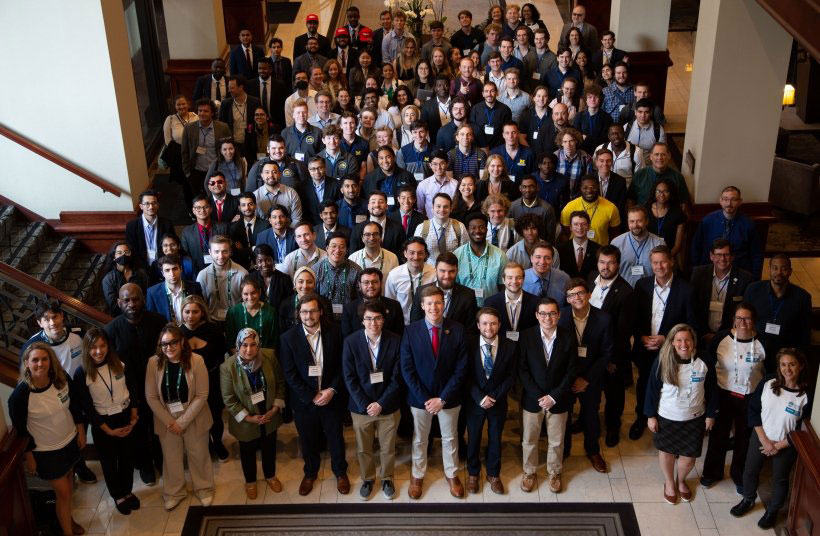MAY 10, 2023
DOE Also Announces 30 Teams Selected for the 2024 Competitions

2023 Hydropower and Marine Energy Collegiate Competition Competitors (Image Credit: Department of Energy)
The U.S. Department of Energy (DOE) today announced the winners of the 2023 Hydropower Collegiate Competition (HCC) and Marine Energy Collegiate Competition (MECC). Endicott College and University of New Hampshire were the overall winners of the inaugural HCC and the fourth annual MECC, respectively. DOE also announced the teams selected to participate in the 2024 HCC and MECC.
“I congratulate the winners of the 2023 Hydropower and Marine Energy Collegiate Competitions for demonstrating new possibilities for how we can use hydropower and marine energy to help meet our climate and clean energy goals,” said Alejandro Moreno, Acting Assistant Secretary for Energy Efficiency and Renewable Energy. “I am excited to see these talented students utilize the real-world experiences and connections they gained through these competitions and hope to see them continue to support our clean energy transition.”
Hydropower and marine energy resources are key to meeting the Biden administration’s goals of a carbon-free electricity sector by 2035 and a net-zero-emissions economy by 2050. These types of power depend on the movement and flow of water and are, therefore, predictable and consistently available. This makes them reliable and well-suited to help balance an electricity grid with higher levels of variable renewable energy like wind and solar.
To help reach those goals, the hydropower and marine energy industries will need a new generation of qualified workers to fill many different roles, including engineers, financial analysts, project managers, and communications and marketing specialists. The HCC and MECC help undergraduate and graduate students prepare for jobs in hydropower, marine energy, and related industries by challenging them to develop unique solutions to advance these technologies.
Both the 2023 HCC and MECC culminated in a final event during Waterpower Week 2023 in Washington, D.C. The hydropower teams pitched their case studies and the marine energy teams pitched their business plans and detailed technology designs to panels of judges. All teams also presented their approaches to creating connections among the industry and their local communities.
2023 Hydropower Collegiate Competition Winners
The 10 student-led teams analyzed a case study on how hydropower fits into a future power grid supported by 100% renewable energy and the associated opportunities and challenges of incorporating the hydropower fleet into this clean energy vision. They also provided solutions that can help hydropower fully support a clean energy grid.
The winners of the 2023 HCC are:
- First place: Endicott College
- Second place: Yale University
- Third place: Northern Arizona University
Individual category winners are:
- Best Poster: Texas Tech University
- Case Study Contest: Endicott College
- Connection Creation Contest: Yale University
2023 Marine Energy Collegiate Competition Winners
The 19 student-led teams developed designs and business plans to power blue economy activities using a range of marine energy technologies. Eighteen competitors also tested prototypes of their designs in test-tanks across the country.
The winners of the 2023 MECC are:
- First place: University of New Hampshire
- Second place: California Polytechnic State University
- Third place: Purdue University
Individual category winners are:
- Best Poster: University of Massachusetts Dartmouth
- Build and Test Challenge: University of Michigan partnered with Virginia Polytechnic Institute and State University
- Best Report: Cornell University
- Best Pitch: University of New Hampshire
- Connection Creation Contest: Manhattan College
- Rookie of the Year Award: California Polytechnic State University
2024 Hydropower and Marine Energy Collegiate Competitions Competitors
DOE also announced the teams selected to compete in the 2024 HCC and MECC. The 2024 HCC asks teams to suggest solutions for adding power-generating infrastructure to existing non-powered dams, and the 2024 MECC continues to ask teams to develop solutions for ways marine energy can help power the blue economy.
Ten teams were selected for the second annual HCC.
- California Polytechnic State University
- California State University, Fresno
- Columbia University
- Johns Hopkins University
- Northern Arizona University
- Texas Tech University
- University of Houston
- University of Michigan
- University of North Florida
- University of Wisconsin-Platteville
Twenty teams were selected for the fifth annual MECC.
- Arizona State University
- California Polytechnic State University
- California State University, Fresno
- California State University, San Marcos
- Federal University of Rio de Janeiro
- Illinois Institute of Technology
- Manhattan College
- Michigan Technological University
- Northeastern University
- Oakland University
- Oregon State University
- Purdue University
- Rutgers University
- Stevens Institute of Technology
- University of California, Riverside
- University of Massachusetts Dartmouth
- University of New Hampshire
- University of North Carolina at Charlotte
- University of Houston
- Webb Institute
The two competitions have so far engaged a combined total of 15 minority-serving institutions, including Asian American and Native American Pacific Islander-serving institutions, historically Black colleges and universities, Hispanic-serving institutions, and tribal colleges and universities, as well as 13 international schools.
DOE’s Water Power Technologies Office funds both competitions. The National Renewable Energy Laboratory (NREL) administers the MECC, and NREL and the Hydropower Foundationadminister the HCC.